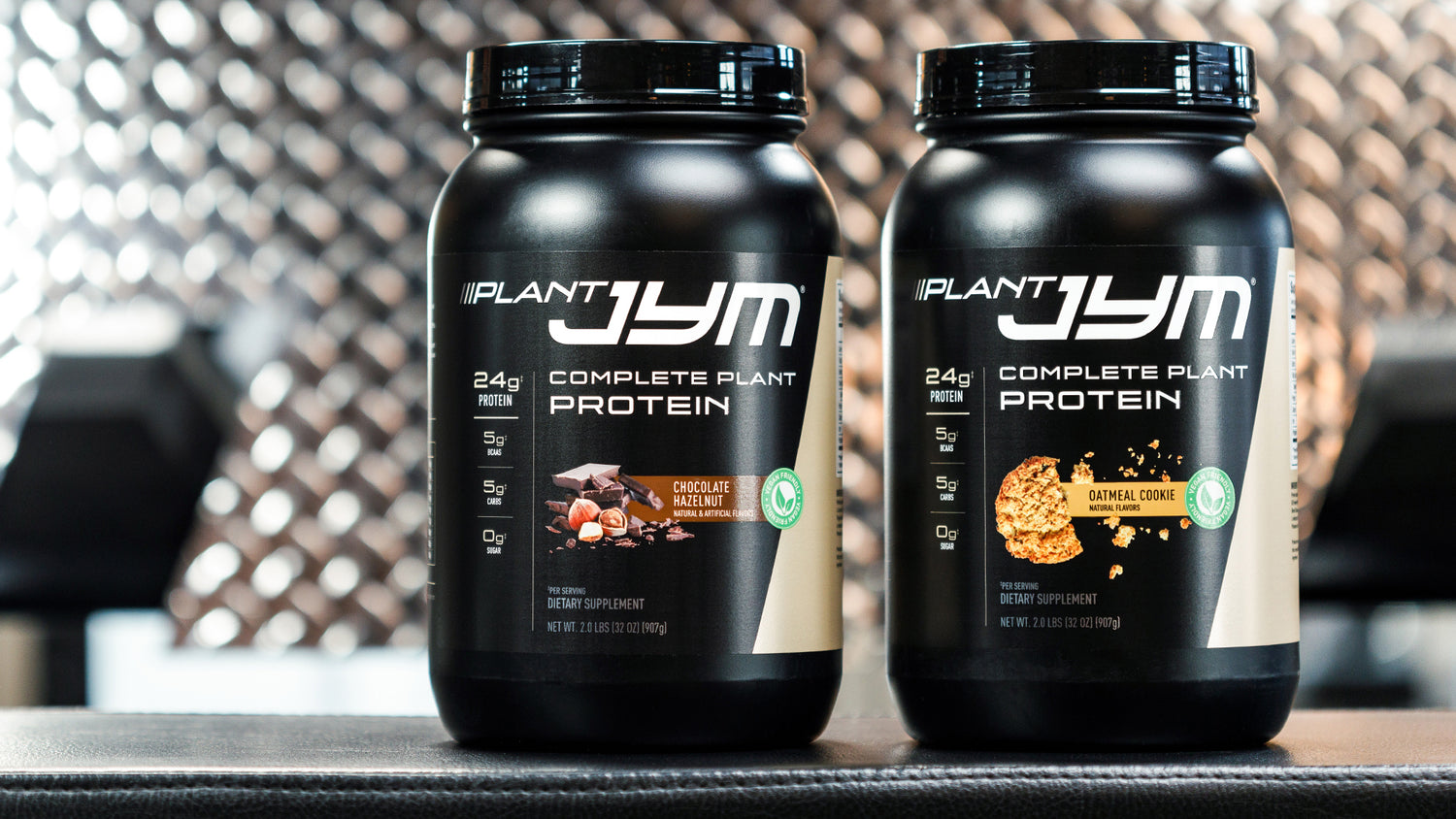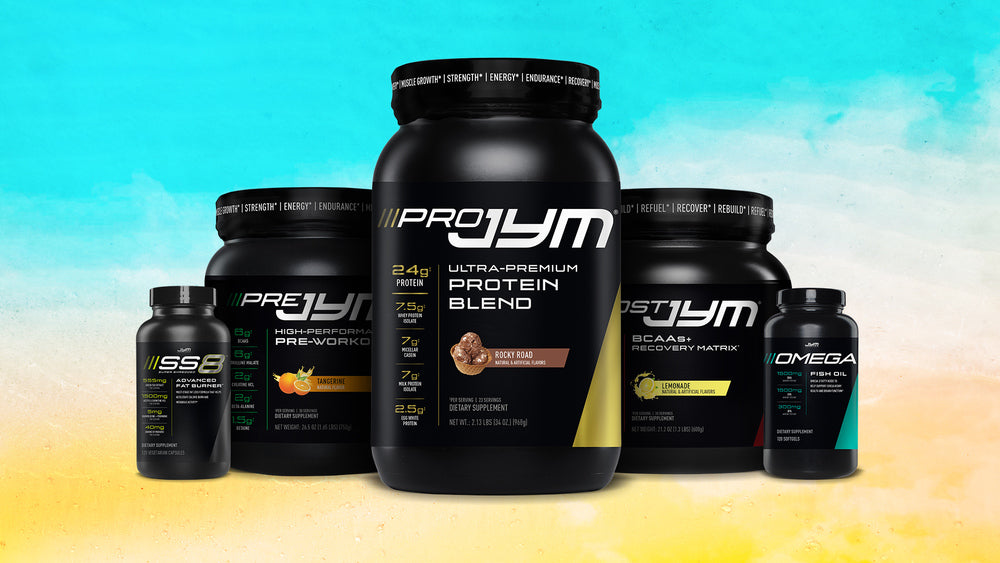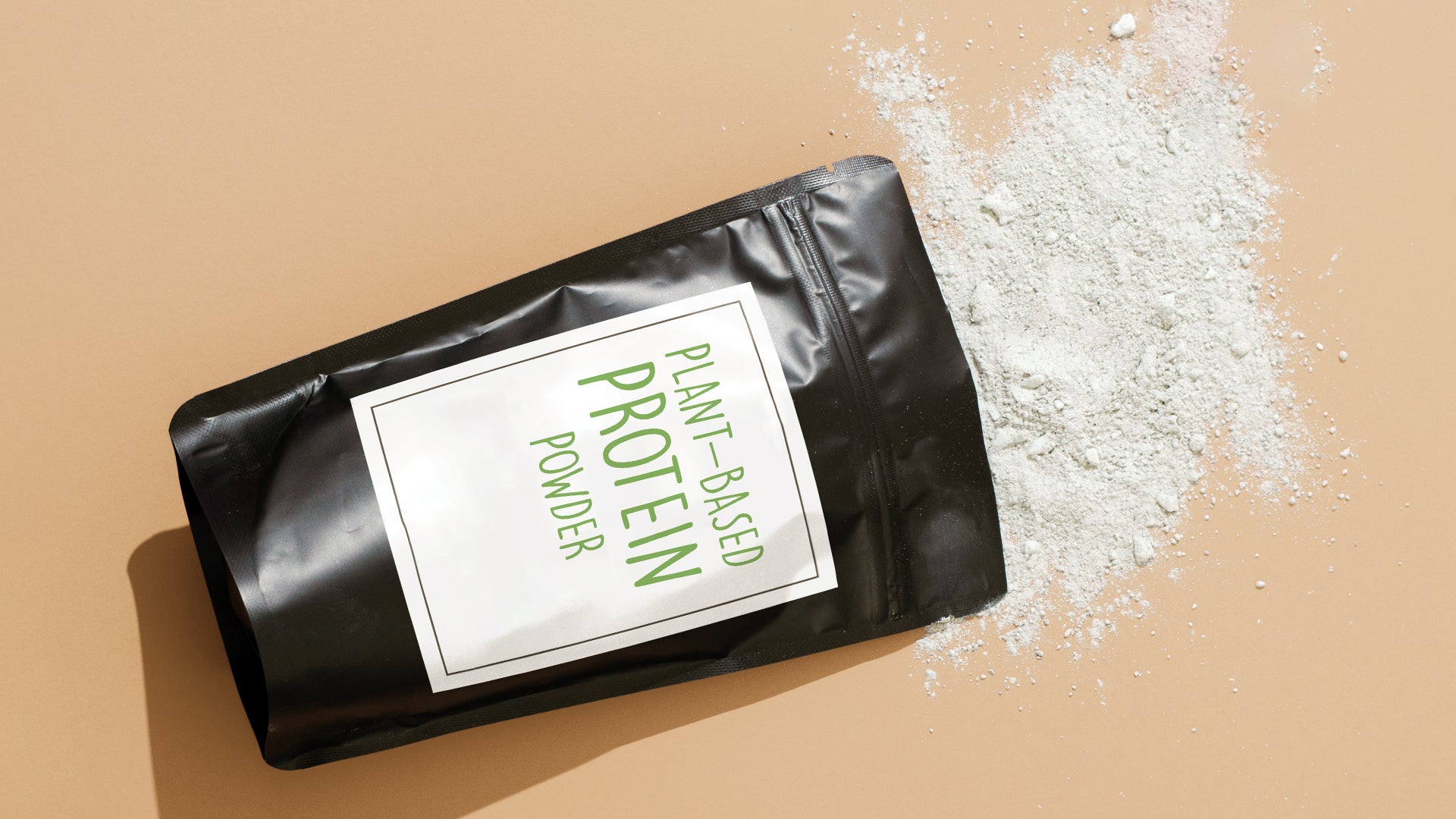Non-dairy, soy-free, gluten-free... and the most anabolic plant-based protein powder on the market.
Finally, there’s a plant-based alternative that can help you build just as much lean muscle – my brand-new Plant JYM.
Plant JYM is unlike any other product currently on the market – a vegan, gluten-free, soy-free, 100% plant-based protein powder that delivers 24 grams of anabolic protein per scoop.
Other popular plant proteins on the market fall way short on key amino acids (including BCAAs) needed to maximize protein synthesis and muscle building. At the same time, they include excess carbohydrates due to using protein concentrates, as opposed to the blend of pea and rice protein isolates in Plant JYM that have considerably fewer carbs to promote lean muscle gains.
Plant JYM represents the pinnacle of protein innovation, a product that’s literally been years in the making. What makes Plant JYM superior to other plant-based protein powders? These four aspects in particular:
-
- More protein! Plant JYM contains 24 grams of plant-based protein. More importantly, because it uses protein isolates from pea and rice instead of protein concentrates, you’re getting a higher percentage of protein per scoop. The ability to create plant isolates is brand-new technology (which is why most other plant protein powders are still using concentrates), and Plant JYM is on the cutting edge of it.
- Fewer carbohydrates, with only 5 grams of carbs per scoop, no sugar, and no sugar alcohols.
- Anabolic amino acid profile. Plant JYM has 5 grams of BCAAs per scoop in the ideal 2:1:1 ratio of leucine to isoleucine to valine, plus the essential amino acids methionine, lysine, and tryptophan. Plant JYM is basically the plant-based equivalent of my award-winning Pro JYM protein blend. It’s way more anabolic than your typical plant-based protein powder.
- Great taste and NO grittiness, as opposed to other plant protein powders you have to choke down because they taste “earthy.” Plant JYM’s Oatmeal Cookie and Chocolate Hazelnut flavors are amazing!
What’s NOT in Plant JYM?
Each serving of Plant JYM is free from the following ingredients:
-
- 0 grams of sugar.
- No sugar alcohols.
- No soy.
- No gluten.
- No lactose.
- And, of course, no animal products.
Who is Plant JYM for?
Plant JYM is the perfect protein powder for anyone who…
-
- Is lactose-intolerant, gluten-intolerant, wants to avoid soy, and/or has difficulty digesting animal sources of protein. If dairy-based protein powders like whey cause you GI or stomach discomfort, give Plant JYM a try.
- Is vegan or vegetarian. If this is you, you’re probably used to having to find “alternative” protein powders that don’t come from dairy or meat sources. Plant JYM definitely caters to your nutritional needs.
- Wants a low-fat, low-carb source of high-quality protein that will help deliver lean muscle gains as well as strength. In other words, someone who lifts weights intensely, wants to get more muscular and shredded, and needs a protein powder to support these serious physique and performance goals.
- Simply wants to get the benefits of more plant-based food sources in his or her diet. Even if you’re not vegan or vegetarian and you regularly consume dairy-based proteins (like Pro JYM), Plant JYM is a great way to “diversify” your protein intake without sacrificing any muscle or performance gains.
- Has tried a number of other plant-based protein powders but can’t stand the taste and texture of them. I NEVER overlook taste when I’m formulating my products, and Plant JYM was no exception. I made it my mission to create a plant-based protein powder that’s a pleasure to drink, and I achieved that with Plant JYM. I want people to crave a Plant JYM shake just as much as a Pro JYM one!
Why I created Plant JYM
I started working on Plant JYM several years ago – out of necessity. I’ve had gastrointestinal (GI) issues all my life. I was very skinny as a kid and struggled to gain weight, and although it may not look like it now, these issues and struggles have followed me throughout my life.
Most recently, I became so sick that it seemed like there was nothing I could eat that didn’t wreak havoc on my system. Desperate to fix the problem on my own (because even the medical doctors I went to couldn’t help me), I went on an elimination diet to figure out what, if anything, I could eat. I lived on only plain ground beef for months, then I slowly added sweet potatoes to my diet, then oats, and so on with other individual foods, one at a time.
I also found that most plant-based foods were okay for my body, except for wheat and soy. If I was going to make plants a focal point of my diet, however, I knew that getting high-quality protein (and a lot of it) was going to be a challenge.
As anyone who follows me knows, I strongly believe in consuming at least 1 gram of protein per pound of bodyweight per day, and ideally 1.5 to 2 grams. Because hitting these protein numbers every day just with whole foods – not to mention, plant-based foods – is difficult, protein powder is a must.
So, I started the initial formulations for Plant JYM, with some very ambitious parameters: I needed to make a plant-based protein powder that was gluten-free (because of my wheat intolerance), soy-free, and just as anabolic as my animal-based protein powder Pro JYM to maximize muscle recovery and growth.
Plant JYM had to be Pro JYM’s equal – but with plant-sourced protein. Easier said than done. When I first started working on this, the technology to accomplish this lofty goal didn’t exist… so I pushed hard to make it happen.
Why Plant Proteins aren’t “complete”
The reason animal proteins (like meat) and dairy-based protein powders (like whey and casein) have always been preferred over plant proteins for those looking to build muscle is that most plant proteins are not “complete proteins.” Meaning, they’re lacking one or more of the 9 essential amino acids (EAAs) – three of those EAAs being leucine, isoleucine, and valine, better known as the branched-chain amino acids (BCAAs).
And even the complete plant proteins (those that contain all 9 EAAs) lack sufficient amounts of the key amino acids, especially BCAAs, that are necessary for building muscle.
Bottom line: In raw form, animal proteins have an edge over plant proteins in terms of amino acid profile for building muscle size and strength. That’s why I designed Pro JYM with two dairy proteins (whey and casein); this blend maximizes protein synthesis, and thus recovery and muscle mass gains, due to its optimal amino acid profile.
The amino acid shortcomings of plant-based foods is also why I had to put so much time, research, and effort into formulating Plant JYM – because I wanted to turn plant proteins’ weaknesses into strengths.
The 4 Problems with Plant-Based Protein Powders… and How Plant JYM Solves Them!
There are four huge issues with typical plant protein powders you find on the shelves – and Plant JYM addresses all four of them.
The four problems with most plant-based protein powders are:
-
- Not enough protein per serving
- Too many carbs
- Crappy amino acid profiles (and thus not very anabolic)
- Bad taste and grittiness
And here's how Plant JYM address these four problems...
Problem #1 Solved – Using isolates instead of concentrates to increase the percentage of protein in each scoop
The first thing to know is that the proteins in Plant JYM are pea and rice isolates, NOT concentrates. This effectively takes care of Problem #1. Because the process of making plant protein isolates is a very new technology, just about all of the plant protein powders you find are still using concentrates.
What’s wrong with concentrates? They’re made up of only around 35%-80% protein; the rest is carbs and fat. Think about that: You’re buying a product specifically because it’s protein, but it’s only 35%-80% protein! Do you really want to be paying for carbs? No, you want protein!
Thanks to the new technology (which is part of the reason it took me years to develop Plant JYM), with isolates you get up to 90% protein and only 10% carbs and fat.
Each scoop of Plant JYM contains 24 grams of protein and only 5 grams of carbs (which is the same as Pro JYM, by the way). If this were concentrates instead of isolates, it would take a bigger scoop and more carbs to deliver 24 grams of protein. With Plant JYM, you’re getting more protein for your money!
Problem #2 Solved – Cutting carbohydrates with isolate technology
Another challenging task I had when creating Plant JYM was to get the carbohydrate content as low as possible. This is protein powder, after all, not a weight gainer!
Thanks to the pea protein isolate and rice protein isolate, I was able to get the formula down to only 5 grams of carbs per scoop, with 1 gram of fiber and zero sugar. The protein extraction and purification process that creates these isolates removes the extra carbs, whereas with plant-based protein concentrates the extra carbs stay in.
Now, we have a plant-based protein powder with the same macros as Pro JYM – not just protein, but also carbs and fat. That means you can expect the same lean gains with Plant JYM as you do with Pro JYM!
Problem #3 Solved – Optimizing the amino acid profile via protein isolates and adding plant-sourced free form BCAAs
Just like plants lack critical amino acids in their natural form, so do most plant-based protein powders, with their low levels of EAAs. Almost all plant-based protein powders are low in BCAAs, which are the most important amino acids for building muscle. Plant protein powders also tend to be low in the EAAs methionine, lysine, and tryptophan
Plant JYM is different, in large part due to its 5 grams of free form BCAAs per scoop, including an ideal 2:1:1 ratio of leucine to isoleucine to valine. As I said before, my goal was to get the amino acid types and amounts in Plant JYM equivalent to that in Pro JYM to boost the anabolic potential of my plant-based protein powder. We were able to achieve this, again, by going with pea and rice isolates instead of concentrates. More protein per scoop equals more key amino acids like BCAAs.
But that wasn’t enough to get the amino acid profile I needed, so I fortified Plant JYM by adding more free form EAAs – especially BCAAs (getting them from plant sources, of course). Free form BCAAs provide a faster anabolic stimulus than BCAAs found in whole proteins.
As a result of all the hard work and innovation, we created a plant-based protein powder in Plant JYM that has the same amount of protein per scoop as Pro JYM and a nearly identical amino acid profile! This essentially makes Plant JYM just as anabolic as Pro JYM – equally effective for spiking muscle protein synthesis and encouraging better muscle recovery and growth.
Problem #4 Solved – Great taste and NO grittiness due to isolates and innovative flavoring
Getting the amino acid profile and macros to match Pro JYM was one thing; getting Plant JYM to taste great, without all the grittiness that most plant-based protein powders have, was a whole other beast!
Fortunately, the isolate technology helps achieve a smoother, better tasting product. There’s no grittiness at all in Plant JYM and no weird earthy or dirt tones to the taste or aftertaste.
What does Plant JYM taste like? The names of the flavors tell it all – it tastes like Oatmeal Cookie or Chocolate Hazelnut! Plant JYM tastes so smooth that you won’t believe you’re drinking a plant-based protein powder!
Amino Acids vs. Whole Proteins
One topic that’s debated a lot is whether it’s better to get your amino acids from whole proteins (which are strings of amino acids) versus individually as “free form” amino acids. Conventional wisdom would say it’s better to get them through proteins, but in some cases it’s actually better to consume free form amino acids rather than getting those aminos through whole proteins.
One of these cases is immediately after a workout. You don’t want to eat a big steak or chicken breast after you train to get your protein; it would take too long to digest and get to your muscles. At this time, a protein powder is a better option. Timing is the key element here.
Also, one study showed that male subjects taking leucine on its own as a free form amino acid had twice as much leucine in their blood, and the leucine showed up in their blood faster, than when they consumed a whole food protein source for their leucine. This points to the benefit of putting free form amino acids (leucine in particular) into a protein power, which is what I did with Plant JYM.
What should I mix Plant JYM with?
Plant JYM mixes and tastes amazing with plain water (the colder, the better). But if there’s a plant-based “milk” you prefer, go ahead and use that. Assuming many people are using Plant JYM as an alternative to dairy- and soy-based protein powders, mix Plant JYM with your choice of non-dairy, non-soy milk (like almond milk or cashew milk).
And just like Pro JYM, feel free to make a shake or smoothie with Plant JYM that also includes fruit, like a banana. If drinking Plant JYM on its own, mix 1-2 scoops with your liquid of choice in a shaker cup the same way you would with Pro JYM.
That said, you can mix Plant JYM with cow’s milk – I do! If you’re not lactose-intolerant or 100% vegan, and you have no other reason to avoid dairy, this is actually a great option. Why? Because you’re getting the benefits of both plant-based protein and the whey and casein proteins in milk. With this combo, you’re still avoiding gluten and soy, which is important for a lot of people.
How to get more protein as a vegan – Using Plant JYM
Plant JYM can be used in the exact same way as Pro JYM. Here are some good times to consider using Plant JYM:
First thing in the morning – to get your muscles a dose of protein to start the day, mix 1 scoop of Plant JYM with water or milk (non-dairy, non-soy) as your first meal of the day.
Pre-Workout – 1 scoop, mixed in water or milk (non-dairy, non-soy), 30-45 minutes before training (around the same time you take Pre JYM).
Post-Workout – 1-2 scoops, mixed in water or milk (non-dairy, non-soy), immediately after training (around the same time you take Post JYM).
Between meals – Any time you want a shot of high-quality protein as a snack, mix 1 scoop of Plant JYM in water or non-dairy, non-soy milk.
Before bedtime – Plant JYM doesn’t include slow-digesting casein like Pro JYM, but it’s still a great option to take at night before bed to provide your muscles amino acids for recovery during the night. In fact, both pea and rice proteins are considered medium-digesting proteins – not as slow absorbing as casein, but not as fast as whey.
Should I take Plant JYM if I’m already using Pro JYM?
With Plant JYM and Pro JYM having essentially the same macronutrient and amino acid profiles, you can use either/or (depending on your dietary needs and preferences), or both.
If you’re already taking Pro JYM and love it (as everyone who takes Pro JYM does!), by all means keeping taking it around workouts, between meals, and before bedtime. But I encourage you to at least try Plant JYM, if for no other reason than to have proof that a plant-based protein can actually deliver muscle-building results and taste delicious.
If you try Plant JYM and love it as much as I do, go ahead and alternate between Pro JYM and Plant JYM over the course of your day or week. If you do this, I recommend using Pro JYM after workouts (because of how fast whey absorbs) and before bedtime (because of how slow casein absorbs).
Is vegan protein good for you? If I’m not vegan or vegetarian, can I still benefit from taking Plant JYM?
Yes, absolutely! Whether you eat meat and dairy or not, I always recommend getting a variety of plant-based foods in your diet, including plant proteins like pea and rice. As you probably know, plants offer many nutritional benefits, even if just taking the protein portion of them.
As I said above, Plant JYM has essentially the same amino acid profile as Pro JYM, so it will be great for your muscles and your body whether you eat meat or dairy in addition to it or not.
The best brand of vegan protein for building muscle – Plant JYM
When you’re choosing a plant-based protein powder for whatever reason, reach for the only one that covers you on optimal protein content and amino acid profile, keeps carbs low, and tastes nothing like what you might expect a plant-based protein powder to taste like.
Plant JYM has raised the bar for vegan-friendly, plant-based protein powders. Get it now here at JYMSupps.com.



